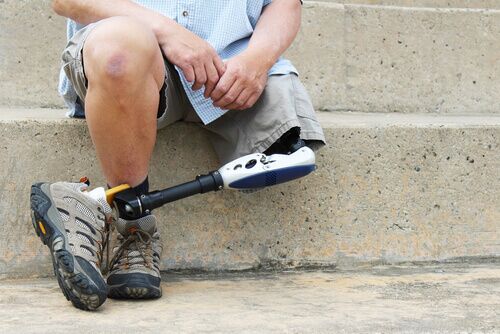Dallas Loss of Limb & Amputation Attorneys

Some amputations are the result of diseases, such as diabetes and peripheral arterial disease. However, in many cases, limbs are lost as the result of accidents. When this occurs, it is known as “traumatic amputation.”
In a study of 8,910 amputees published in The American Journal of Surgery, blunt trauma was the cause of injury in 83 percent of the cases, most commonly in car accidents, followed by machinery accidents. Among the patients studied, car accident victims lost more upper body limbs, while motorcyclists and pedestrians suffered a greater number of lower extremity amputations.
If you or a loved one has suffered an amputation because of an accident caused by someone else’s negligence, you may be entitled to compensation for your losses. You should seek legal advice immediately – before you discuss the matter with an insurance adjuster and before you sign anything.
Let the law offices of Kraft & Associates, P.C., advise you about your rights after an accident that resulted in limb loss. We’re an established and professional law firm with friendly lawyers and staff who are easy to talk to. Please call us at (214) 999-9999 or contact us online.
About Traumatic Limb Loss and Amputation
An accident or injury can sever a body part. If the limb or digit is completely severed – complete amputation – it may be reattached if proper care is taken of the stump and severed body part.
If some soft tissue remains connecting the limb or digit to the body, this is known as a partial amputation. The severed body part may or may not be able to be reattached, depending on the severity of the injury. In some accidents, a digit or limb is not severed, but it sustains such serious damage that it must be surgically removed.
Serious complications can result from complete or partial amputations, including bleeding, infection and shock. Amputees are often left with serious physical limitations and may require prosthetics and adaptive devices.
Causes of Amputation and Limb Loss
Amputations occur in many different types of accidents, including car accidents, motorcycle accidents, pedestrian accidents, truck accidents and workplace accidents.
Motor vehicle accidents are a leading cause of amputations. Limbs are sometimes crushed or severed by sharp metal in car accidents. Fingers, toes, hands and feet can be damaged too severely to be reconstructed and must be surgically amputated.
Amputations are also frequently caused by factory, farm or power tool accidents. OSHA reports that amputations are widespread in the workplace and involve a variety of equipment and activities. In working with machinery, OSHA names the following as the most common hazardous mechanical motions for causing amputations: rotating, reciprocating (back and forth or up and down motion), transversing (straight and continuous line of motion), cutting, punching, shearing and bending.
Contact Our Dallas Amputation Accident Attorneys
If you have lost a limb or suffered an amputation in accident caused by someone else’s negligence, it is important to consult with a knowledgeable personal injury attorney and actively pursue the maximum compensation you are entitled to receive. Medical expenses, rehabilitation costs and lost wages related to a lost limb are extremely high and will likely continue throughout your lifetime.
The experienced lawyers at Kraft & Associates, Attorneys at Law, P.C., are dedicated to protecting your rights and helping you obtain the compensation you deserve. We can thoroughly examine the facts in your case and work with investigators to establish liability of the party who caused your injuries. Our lawyers have been helping limb loss victims in Northern Texas for decades.
We know to handle amputation cases, and we have helped clients obtain fair compensation for their injuries. Whether your case is settled out of court or we take it to trial, you can rest assured that we have the skills and experience needed to provide you with vigorous representation in your accident claim.
Please contact us for a Free consultation
Sources:
- Amputee Coalition: Limb Loss Statistics
- The American Journal of Surgery: Epidemiology of post-traumatic limb amputation: a National Trauma Databank analysis
- National Institutes of Health: Medline Plus: Amputation – traumatic
- OSHA Fact Sheet: Amputations